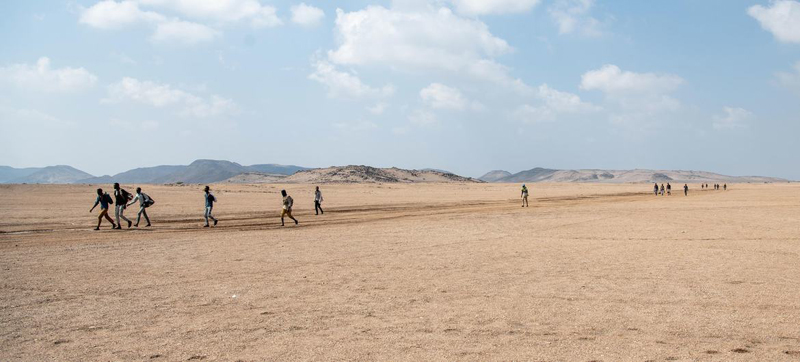 Horn of Africa
Horn of Africa Horn of Africa: $84 million appeal to support migrants along risky route to Yemen
The International Organization for Migration (IOM) and partners are seeking $84 million to provide humanitarian and development assistance to over one million migrants in the Horn of Africa and communities hosting them.
The Regional Migrant Response Plan, launched this week, will address the dire needs and protection risks facing people along the treacherous Eastern Route towards the Arabian Peninsula.
Other objectives include scaling-up delivery of lifesaving and resilience-building initiatives and implementing long-term sustainable solutions for both migrants and host communities.
Dangerous journeys
The Eastern Route is one of the busiest, most complex and dangerous migration corridors in the world, cutting through deserts, seas and war-torn Yemen.
Every year, thousands of people from countries in the Horn of Africa leave their homelands and take to it in search of a better life elsewhere.
They are fleeing interconnected crises, including persistent insecurity and conflict, harsh climatic conditions, and public health emergencies, in addition to socio-economic drivers and more traditional seasonal factors.
Most make the dangerous crossing of the Red Sea through Bossaso in Somalia, and Djibouti’s coastal town of Obock to Yemen and further by land to Gulf countries.
‘An underserved crisis’
Last year, some 145,545 migrants entered Djibouti - almost double the number in 2021.
Additionally, 89 migrant deaths or disappearances were recorded along the Eastern Route due to hazardous transportation, illness, harsh environmental conditions, drowning at sea and violence. Many more deaths and disappearances go unreported.
“The Eastern Route is an underserved crisis easily forgotten amidst other global crises, and we must accord the migrants the support and dignity they deserve,” said IOM Director General, António Vitorino.
Support for voluntary returns
The Regional Migrant Response Plan will address the most immediate and critical humanitarian and protection needs of migrants in vulnerable situations.
It will also support their voluntary return home in a safe and dignified manner, and ensure that they reintegrate back into their communities successfully.
“The plan provides a flexible mechanism for all stakeholders to respond to evolving migration trends, and broader humanitarian and development challenges affecting migrants, host communities and the respective governments,” said Mr. Vitorino.
Funding will further help efforts towards addressing the drivers of irregular migration and strengthen the capacity of governments in the region on migration management, including in ensuring greater coordination and collaboration.
Support Our Journalism
We cannot do without you.. your contribution supports unbiased journalism
IBNS is not driven by any ism- not wokeism, not racism, not skewed secularism, not hyper right-wing or left liberal ideals, nor by any hardline religious beliefs or hyper nationalism. We want to serve you good old objective news, as they are. We do not judge or preach. We let people decide for themselves. We only try to present factual and well-sourced news.







